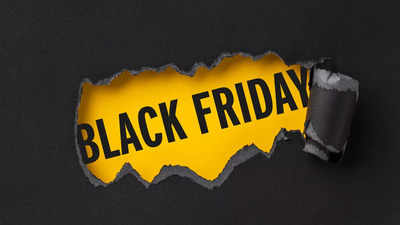- News
- Education News
- Learning with TOI News
- Black Friday: Do you know why this day is celebrated in November?
Trending
This story is from November 24, 2023
Black Friday: Do you know why this day is celebrated in November?
Today is 24th November. Black Friday, celebrated in November, signifies the start of the holiday shopping season. Originating in the US, it's renowned for massive discounts, bustling stores, and online deals. The term stems from businesses going 'in the black'—making profits. It's a day consumers eagerly await for unbeatable sale.

Representative Image
Black Friday, celebrated globally but especially in the USA, falls on the final Friday of November. This year it is today, 24th November. Originating there, it's a pre-Christmas sale filled with special deals and surprise discounts at various stores and online platforms. Exploring its history and traditions helps uncover the essence of this consumer-friendly event.
What is Black Friday?
Black Friday symbolizes an annual shopping frenzy, erupting the day after Thanksgiving in the United States.It's a retail extravaganza renowned for colossal discounts and unparalleled deals across stores and online platforms. Originating from its ability to propel businesses 'into the black,' this event unleashes a consumer feeding frenzy. Shoppers eagerly anticipate slashed prices on electronics, clothing, and more, often queuing for hours before stores open or scouring the internet for lightning deals. This day transcends borders, embraced globally as a phenomenon heralding the holiday shopping season. Black Friday isn't just about bargains; it's a cultural spectacle and a shopper's paradise.
History of Black Friday
In the '80s and '90s, Black Friday evolved into a nationwide shopping extravaganza. It became the unofficial starting point for the holiday shopping season, characterized by eye-popping discounts and doorbuster deals. As online shopping gained traction, Cyber Monday emerged, extending the shopping spree beyond brick-and-mortar stores.
Black Friday's popularity transcended the United States, spreading globally to countries like Canada, the UK, and beyond. The concept of offering deep discounts and unbeatable deals quickly became a global phenomenon. Despite debates about its impact on consumerism and the commercialization of holidays, Black Friday remains a cultural touchstone, a day when shoppers eagerly hunt for bargains and retailers eagerly anticipate a surge in sales to close out the year.
Black Friday: Interesting facts
What is Black Friday?
Black Friday symbolizes an annual shopping frenzy, erupting the day after Thanksgiving in the United States.It's a retail extravaganza renowned for colossal discounts and unparalleled deals across stores and online platforms. Originating from its ability to propel businesses 'into the black,' this event unleashes a consumer feeding frenzy. Shoppers eagerly anticipate slashed prices on electronics, clothing, and more, often queuing for hours before stores open or scouring the internet for lightning deals. This day transcends borders, embraced globally as a phenomenon heralding the holiday shopping season. Black Friday isn't just about bargains; it's a cultural spectacle and a shopper's paradise.
History of Black Friday
Black Friday traces its roots back to mid-20th century Philadelphia, where police used the term to describe the chaotic crowds flooding the city the day after Thanksgiving. It marked the Army-Navy football game and the influx of shoppers, causing traffic gridlock and headaches for law enforcement. Over time, retailers co-opted the term, giving it a positive spin to signify the moment their annual sales pushed them into profitability or "the black."
In the '80s and '90s, Black Friday evolved into a nationwide shopping extravaganza. It became the unofficial starting point for the holiday shopping season, characterized by eye-popping discounts and doorbuster deals. As online shopping gained traction, Cyber Monday emerged, extending the shopping spree beyond brick-and-mortar stores.
Black Friday's popularity transcended the United States, spreading globally to countries like Canada, the UK, and beyond. The concept of offering deep discounts and unbeatable deals quickly became a global phenomenon. Despite debates about its impact on consumerism and the commercialization of holidays, Black Friday remains a cultural touchstone, a day when shoppers eagerly hunt for bargains and retailers eagerly anticipate a surge in sales to close out the year.
Black Friday: Interesting facts
- Black Friday got its name from the idea of businesses going from 'in the red' (being in debt) to 'in the black' (making profits). Originally, it was known as 'Big Friday,' but that name didn’t stick.
- In 2011, Walmart, a massive retailer, changed the tradition by opening on Thanksgiving night, breaking the usual Black Friday routine. This move shifted the shopping trend, sparking early openings for others too.
- Black Friday's influence spread beyond the US. In Mexico, it's called 'El Buen Fin,' or 'good weekend,' happening after the Mexican Day of Revolution celebrations.
- There's also
Buy Nothing Day , which protests against excessive consumerism. It falls on the same day as Black Friday, promoting mindful spending and challenging the shopping craze. - Colombia celebrates two Black Fridays, one in November, the other in May for better profits.
End of Article
FOLLOW US ON SOCIAL MEDIA










